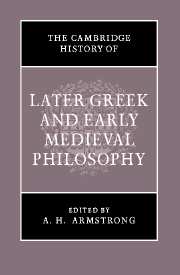Book contents
- Frontmatter
- Chapter 1 Introductory
- Part 1 GREEK PHILOSOPHY FROM PLATO TO PLOTINUS
- Part II PHILO AND THE BEGINNINGS OF CHRISTIAN THOUGHT
- Part III PLOTINUS
- Part IV THE LATER NEOPLATONISTS
- Part V MARIUS VICTORINUS AND AUGUSTINE
- Part VI THE GREEK CHRISTIAN PLATONIST TRADITION FROM THE CAPPADOCIANS TO MAXIMUS AND ERIUGENA
- Part VII WESTERN CHRISTIAN THOUGHT FROM BOETHIUS TO ANSELM
- Part VIII EARLY ISLAMIC PHILOSOPHY
- Chapter 39 Introductory
- Chapter 40 Al-Fārābī and his successors
- Select Bibliography
- Additional Notes and Bibliography
- Index of ancient and medieval works referred to in the text
- General Index
- Index of Greek terms
- References
Chapter 39 - Introductory
from Part VIII - EARLY ISLAMIC PHILOSOPHY
Published online by Cambridge University Press: 28 March 2008
- Frontmatter
- Chapter 1 Introductory
- Part 1 GREEK PHILOSOPHY FROM PLATO TO PLOTINUS
- Part II PHILO AND THE BEGINNINGS OF CHRISTIAN THOUGHT
- Part III PLOTINUS
- Part IV THE LATER NEOPLATONISTS
- Part V MARIUS VICTORINUS AND AUGUSTINE
- Part VI THE GREEK CHRISTIAN PLATONIST TRADITION FROM THE CAPPADOCIANS TO MAXIMUS AND ERIUGENA
- Part VII WESTERN CHRISTIAN THOUGHT FROM BOETHIUS TO ANSELM
- Part VIII EARLY ISLAMIC PHILOSOPHY
- Chapter 39 Introductory
- Chapter 40 Al-Fārābī and his successors
- Select Bibliography
- Additional Notes and Bibliography
- Index of ancient and medieval works referred to in the text
- General Index
- Index of Greek terms
- References
Summary
Approaches to the study of Islamic philosophy
It appears premature, at the present time, to embark on a history of Islamic philosophy in the Middle Ages. Too many of the basic facts are still unknown. New texts are constantly being discovered. Not all the manuscripts known are available in critical editions, or indeed published at all. Very few commentaries of any standing exist and scarcely any monographs on essential topics. Very few texts—apart from those translated centuries ago into medieval Latin—can be read in translation. It would be of some use, it is true, to survey the information available at present, to list the main facts which have been established beyond doubt and to show where future work should start and which are the most urgent tasks. But this would scarcely agree with the purpose of the present publication. It seems to be more appropriate to discuss the essence of what the Muslims called ‘philosophy’ (falsafa), to explain how, on one side, it depends on Greek thought as taught in the philosophical schools in the later centuries of the Roman Empire, and how on the other side it answers the needs and questions of a new and different world—whose inhabitants speak a different language, Arabic, and adhere neither to the religion of classical Greece nor to Christianity which had taken its place, but follow a Hebraic religion of a new type, Islam. I shall, therefore, confine myself to a minimum of indispensable general facts, so as to concentrate mainly on giving a fuller picture of one outstanding early Muslim philosopher, al-Fārābī, with a view to trying to indicate how and why philosophy never succeeded in reaching in the Islamic world the position which it had maintained in the ancient world for more than a thousand years.
- Type
- Chapter
- Information
- Publisher: Cambridge University PressPrint publication year: 1967

